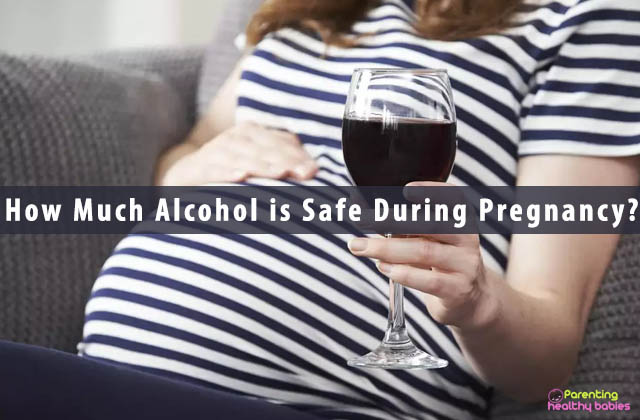Drinking wine during pregnancy is one of the biggest don’ts. If you are someone who likes to unwind with glass of wine after a long day or like to go out for fancy dinners that, of course, include wine, whether or not you can drink alcohol during pregnancy would be one of your biggest concerns.
It is widely believed that drinking excessive alcohol during pregnancy can lead to a lot of complications during pregnancy. There is no way to know exactly how much alcohol consumption is safe during pregnancy, but the short and simple answer would be, no, alcohol consumption isn’t safe when you are with child.
There is, however, lower risk associated with occasional drinking. The risk multiplies when you are a regular drinker. It is therefore advisable to keep you alcohol consumption to a bare minimum if you can’t put a pause on it for nine whole months.
Alcohol During Pregnancy: Safety and Risks
What are the risks associated with drinking during pregnancy?
Drinking alcohol during pregnancy can result in a lot of complications, which are grouped under the category “Fetal Alcohol Spectrum Disorders (FASD)”. The most common of these disorders are Fetal Alcohol Syndrome (FAS) and Fetal Alcohol Effects (FAE). Fetal Alcohol Effects can also be separated into two different categories: Alcohol-Related Neuro-developmental Disorder (ARND) and Alcohol-Related Birth Defects (ARBD).
Fetal Alcohol Syndrome
It is one of the leading causes of mental retardation in fetuses and the only one that you can prevent 100%. However, if your child does get affected by it, then it is non-treatable and lasts for a whole lifetime. The effects of FAS include mental retardation, body deformation, under-development of the skeleton, arrested growth of physical features and height, nervous system complications, issues with social interactions, short attention span, and a lot other problems that can make life very difficult for your child. There are also some distinct facial features associated with this condition, such as small eyes, thin lips, flat cheeks, etc.
There are two distinct effects of FAS:
Alcohol related neuro-developmental disorder
This includes memory, mental and behavioral impairment such as poor attention span, poor motor skills, bad memory and judgment, problems learning new concepts, problems in accurate expression, poor impulse control and other neurological impairments.
Alcohol related birth defects
This includes physical deformities, malfunctioning organs such as heart, liver, kidneys, etc., shortness in stature, under-developed skeletal system, etc.
Fetal Alcohol Syndrome (FAS) differs from Fetal Alcohol Effects (FAE) in that FAS is caused as the result of excess alcohol consumption such are regular drinking, binge-drinking large doses of alcohol, while FAE is the resultant of occasional drinking. It is important to note that both cause lifelong effects and are irreversible once they affect the baby.
There is no way to tell for sure how much alcohol consumption is safe during pregnancy. There is always risk associated with consuming alcohol when you are pregnant. However, the more you drink, the more likely you are to develop severe complications during pregnancy, childbirth and have low post-natal health. It is therefore strongly recommended that you shouldn’t drink alcohol while you are pregnant.
The good news is that both FAS and FAE are completely preventable if you abstain from alcohol completely, throughout your pregnancy. There are doctors who will tell you that the occasional glass of wine wouldn’t hurt your baby, but you must know that even the smallest amount of alcohol in your bloodstream does pose a risk on your baby. No amount of alcohol has been deemed safe for a pregnant woman; therefore it is safe to say that even the occasional glass of wine could potentially have some effect on the development of the fetus.
Health professionals recommend avoiding alcohol completely during pregnancy. It’s particularly important to completely avoid all alcohol in the first trimester, because of the risk of miscarriage. Drinking at this time has also been associated with a higher rate of premature birth.
It’s safest not to drink alcohol at all during pregnancy. However, if you do decide to drink while you’re pregnant, limit it to one or two units of alcohol, no more than once or twice a week, and do not ever get drunk.
Getting drunk by heavy or binge drinking during your pregnancy can cause serious harm to your baby. Heavy drinking is regularly having five or more units of alcohol per day. Binge drinking is six or more units of alcohol in one session.
When you have an alcoholic drink, the alcohol goes into your bloodstream. Once alcohol is in your bloodstream, it reaches your baby across the placenta. This affects the baby and causes all kinds of complications. You will also have to face its repercussions as babies affected by binge drinking are more likely to be affected with various neurological disorders. The possibility of having a preterm birth is also significantly increased if you are a binge-drinker.
The more you drink, the higher your baby’s risk of developing problems that will last a lifetime. These problems range from fetal alcohol spectrum disorders (FASD) to fetal alcohol syndrome (FAS), depending on how heavy or frequent your drinking is.
However, there is no reason to worry if you had a fun night out before you found out you were pregnant. The safest approach to alcohol, both for your baby and you, would be to completely cut alcohol out of your life after you learn of your pregnancy.
References
https://www.google.co.in/search?q=miscarriage&oq=misca&aqs=chrome.1.69i57j0l5.4332j0j7&sourceid=chrome&ie=UTF-8
https://www.babycentre.co.uk/x536390/is-it-safe-to-drink-alcohol-during-pregnancy
